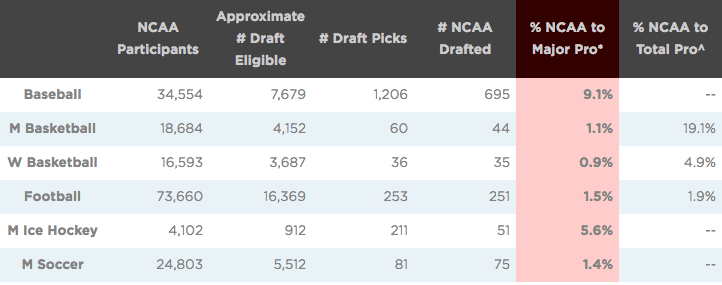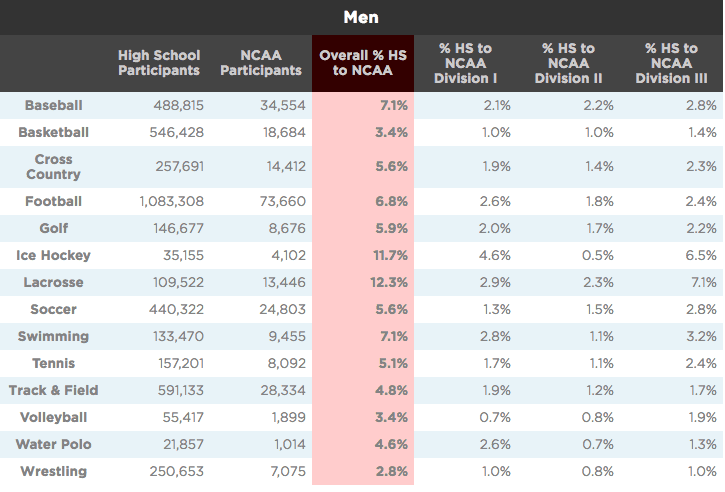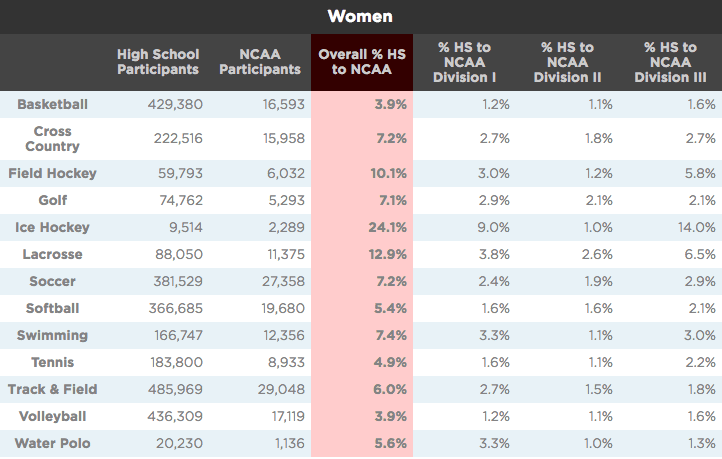For many college athletes, their career ends on the last day of the season, when the final whistle is blown or when they cross the finish line for one last time. The chances of a career continuing to the greatest stage, whether it be the NFL, NBA or perhaps the Olympics, are extremely low.
According to the latest statistics, updated by the NCAA in March 2017, the chances of athletes leaving college and going pro are less than 10%, and even that’s a rare case. The sport with the highest conversion rate to “major pro,” meaning the top league in the United States, is baseball. According to the NCAA, there are nearly 35,000 NCAA baseball players, 7,679 of them are eligible for the draft. But there are only 1,206 draft picks. So how many NCAA players actually get chosen? About 700, 9.1 percent.
Overall, male basketball players have the best chance of playing somewhere. The key word being somewhere. For men, there is a much longer list of options to play basketball: the NBA, the D-League, Europe, even South America and Australia. There are plenty of leagues looking for American talent. So while only 1.1% of male players make it to the “major pro,” the NBA, 19.1% are able to build a career somewhere.
For women basketball players, football players, hockey players and soccer players, the outlook is much grimmer. Take a look at the table below, from the NCAA:
Of course, there aren’t as many women’s teams in the WNBA and abroad, and many baseball and hockey players skip college altogether. The NCAA acknowledges that in hockey “undrafted college players may go on to sign contracts with NHL teams after completing college,” and players are selected in the draft before college age. They do not include those numbers in the NCAA to Major Pro calculations. As for soccer, the numbers don’t include lower level leagues or international opportunities, hence the empty “% NCAA to Total Pro” column.
This isn’t an exact science, but it’s a clearer indication of how many athletes actually go pro, and it’s not many.
Even getting to the college level is an amazing feat.
Per the NCAA, there are about eight million high school athletes in the US and about 480,000 NCAA athletes. Meaning that overall, only about 6% actually make it as college athletes (the chances vary from sport to sport). The breakdown looks something like this:

While we groom the younger generations to become confident athletes, who never give up and fight until the end, we must also groom them for the possibility that it will likely end sooner than they think. Because odds are, it will.
A backup plan may end up being more than just a backup.
This isn’t to say we shouldn’t encourage them and cheer them on at all times. We should. We should be there every step of the way. But we should also be honest from the get-go, and encourage young athletes to pursue an educational interest as well as a sport.

The greatest NBA dynasties of all time
The goal for any basketball franchise is to build a dynasty that fans and experts will be talking about for











